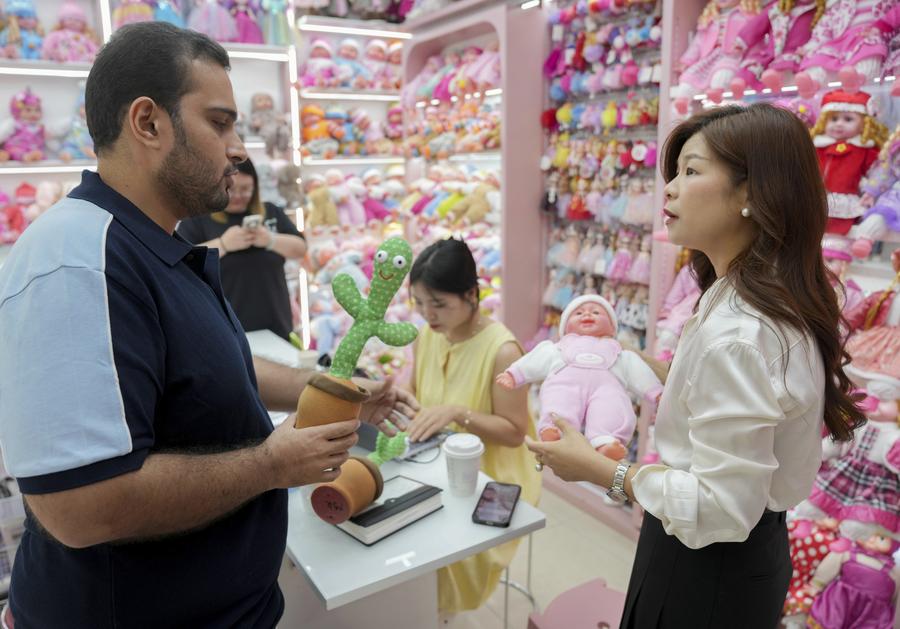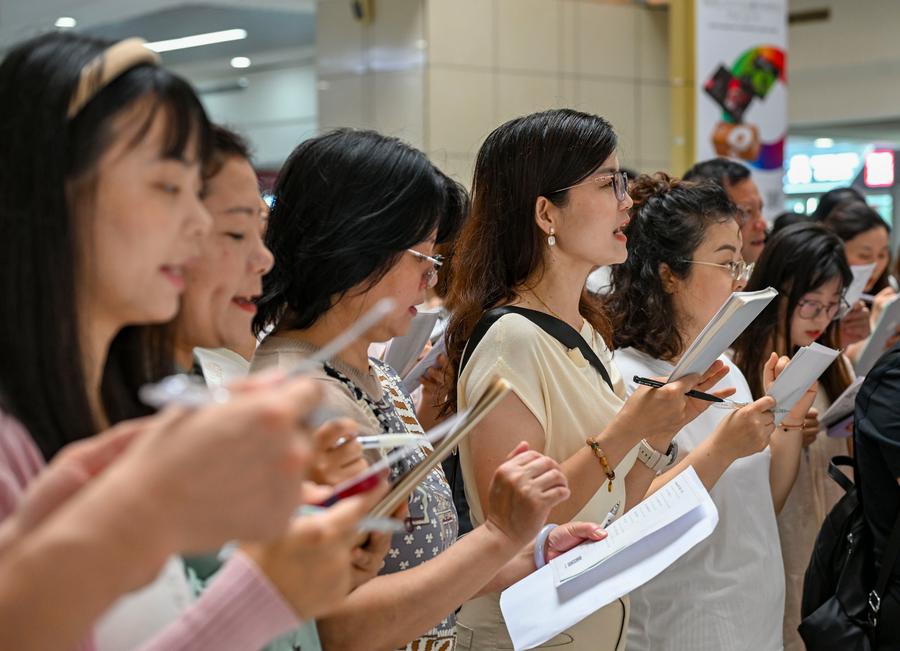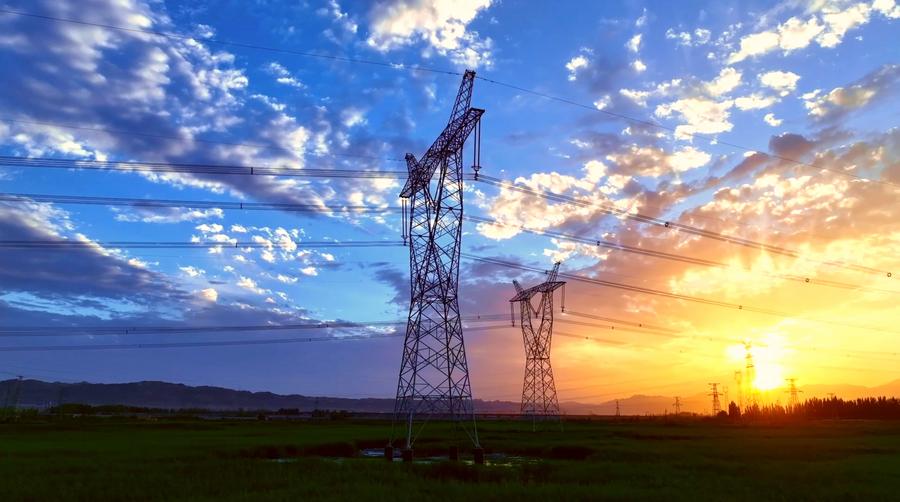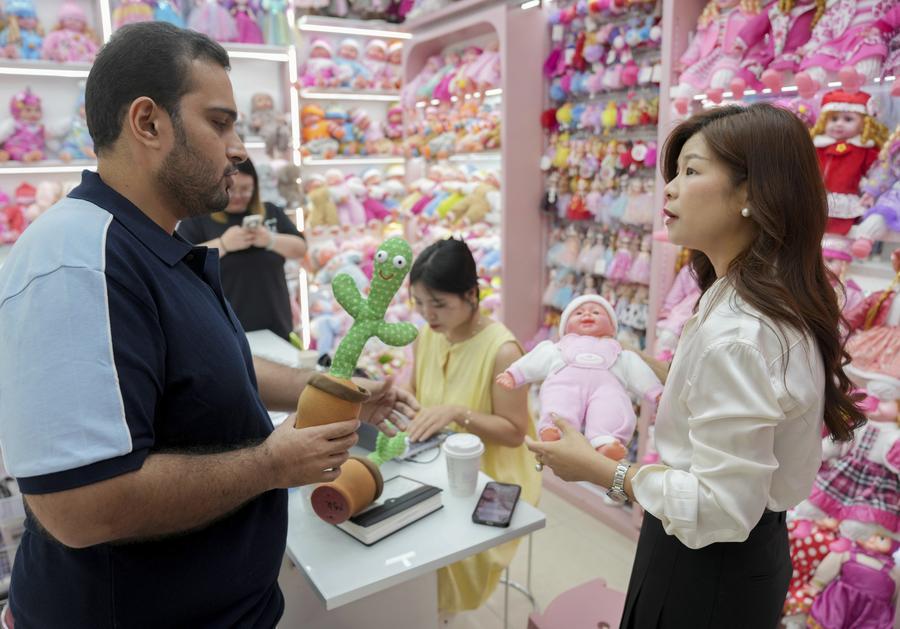
Merchant Sun Lijuan (R) introduces products to an Indian merchant inside her shop at the Yiwu International Trade Mart in Yiwu, east China's Zhejiang Province, May 20, 2025. (Xinhua/Han Chuanhao)
BEIJING, July 31 (Xinhua) -- "It's hot and wet today," chirped a doll in a clear, childlike voice, dressed in a pink floral blouse and a rainbow tulle skirt. The doll was on display at a toy stall in Yiwu City, a bustling trade hub in east China often dubbed the "world's supermarket."
The question -- "What's the weather like today?" -- came from stall owner Sun Lijuan, who has worked in the doll business in Yiwu for over a decade.
Her latest model, now powered by AI, marks a major shift from the talking toys of the past. "It's no longer just a doll that sings, tells stories, or answers basic questions," Sun said. "Now it can respond to almost anything. For kids, it's more like a companion -- a friend."
Sun is currently developing Spanish-language versions and has asked long-time clients to take the new AI dolls' smart modules to South America to test server connectivity.
Amid global tariff headwinds, innovation is unfolding daily in Yiwu across a wide range of industries and products. Local businesses are steadily strengthening both resilience and innovation capacity, driving a 24.5 percent year-on-year increase in the city's exports in the first half of the year.
Visits by foreign buyers in Yiwu jumped 18.6 percent from a year earlier in the first five months, underscoring growing interest in the city's expanding and evolving product lines.
The resilience of the "world's supermarket" echoed a robust 5.3 percent year-on-year growth in China's GDP in the first half of the year. Behind this hard-won result against the global backdrop of economic and trade headwinds, businesses like Sun's tell inspiring stories of agility and enterprise.

Merchants participate in a language learning session at the Yiwu International Trade Market in Yiwu, east China's Zhejiang Province, May 16, 2025. (Xinhua/Chen Shuo)
WEATHERING GLOBAL UNCERTAINTIES
The rapid rollout of new products, Sun said, owes much to China's strengths in innovation and talent. "Since the rapid ascent of DeepSeek earlier this year, we've been approached by many integrated circuit chip developers eager to collaborate on next-generation dolls," she said. "I've never had so much contact with PhDs from top universities and tech firms."
This year has also been one of personal growth for Sun. After DeepSeek gained attention, the Yiwu International Trade Market began offering free AI training and she managed to pick up several software skills.
In March, a long-time client from Mexico visited her shop and requested adjustments to the doll's facial features and clothing. Sun made the edits on her computer within minutes, impressing the client and securing an order on the spot.
"Many people have asked me whether external uncertainties have hit my factory hard, and I always say the impact has been limited," Sun said, noting her factory has, over the years, developed talking dolls in multiple languages, including Spanish, English, Arabic and Russian, for more than 50 markets such as Mexico, Russia, Saudi Arabia and Egypt.
"Entrepreneurs in Yiwu who've made it this far have been tested by the market repeatedly. Without foresight, they would've been pushed out of the market long ago," she added.
The new AI-powered dolls cost three to four times as much to produce as older talking models, but they also bring higher profit margins, according to Sun.
Sun Lijuan said the production cost of the new AI-powered dolls is three to four times that of traditional talking models -- but the added technology also brings higher profit margins.
Sun's toy business offers a glimpse into a broader trend. Across China, companies are drawing on the country's institutional strengths, vast market potential, resilient supply chains, a deep talent pool, and growing innovation and openness to sharpen their resilience and adaptability in an increasingly complex global landscape.
SHARPENING INNOVATION
On the vast Gobi Desert in northwest China's Xinjiang Uygur Autonomous Region, towering high-voltage power lines form a striking "forest of steel." Between the power lines, drones flit in and out of view like birds patrolling their territory, detecting minor faults or unusual objects on the towers and cables.

This photo taken on Aug. 13, 2024 shows a 750-kilovolt (kV) power transmission line under construction in northwest China's Xinjiang Uygur Autonomous Region. (Photo by Ma Yuan/Xinhua)
This is a fully autonomous drone inspection system developed by technology company I-KINGTEC in north China's Tianjin Municipality. A young tech firm founded just eight years ago is helping to solve one of the toughest challenges of power line inspections in uninhabited regions.
Its "Orca" drone can autonomously take off, fly missions and collect data. Serving as its all-weather base, the "Tiger Den" station can automatically replace the drone's battery pod -- a task that once depended almost entirely on manual labor.
"How to make drones truly unmanned throughout the entire workflow has been the question we sought to answer from the very beginning," said Zhu Shengli, co-founder of the company. He noted that the firm's technological breakthroughs have been made possible by China's supportive policies for the low-altitude economy and a strong talent pool.
At Zhu's company, the average age of employees is just 27, and R&D staff make up 70 percent of the workforce. The company has filed more than 600 IP applications to date.
It posted over 200 million yuan (28 million U.S. dollars) in revenue last year, and its first-quarter earnings this year have already exceeded the full-year total for 2024.
China's tech firms like Zhu's have seen strong momentum this year. In the first half of 2025, the country's high-tech sectors posted rapid gains, with value-added industrial output in high-tech manufacturing rising 9.5 percent, 3.1 percentage points higher than the overall industrial growth during the same period.
Sheng Laiyun, deputy head of the National Bureau of Statistics, described the "accumulation of new growth momentum" as a key feature of China's economic performance. He noted an accelerating integration of technological and industrial innovation, which is high on policymakers' agendas.
To boost innovation, China has introduced a series of policy measures this year, including setting up a national venture capital guidance fund expected to mobilize 1 trillion yuan, expanding re-lending for tech innovation and upgrades from 500 billion to 800 billion yuan, and launching a dedicated "sci-tech board" in the bond market. The measures aim to channel more financial resources into early-stage, small-scale, long-term, and hard-tech ventures.
TAPPING VAST DOMESTIC MARKET
At a time when global demand is uneven, China's vast domestic market of over 1.4 billion people continues to serve as a powerful anchor. Consumer demand is evolving rapidly, driving the emergence of new business models and product innovations.
Despite pressures on the broader food service sector, Xibei, a leading Chinese catering chain brand with nearly 400 outlets and around 17,000 employees, is charting a different course by upgrading its children's meals and offering higher-quality options to attract family diners, a strategy that has helped lift overall sales.
The chain now offers four kids' meal set options. One standout is a 69-yuan set featuring a whole yellow croaker, organic vegetables, corn soup, shrimp and egg custard, mousse, and hand-rolled oat noodles. To ensure it's safe for children to eat, each fish goes through three rounds of machine inspection followed by manual deboning.
"Kids' meals are emerging as a powerful driver of family dining. Parents are willing to invest in quality for their children," said Song Xuan, vice president of Xibei.
Sales of Xibei's children's meals rose 7.4 percent year on year last year. Families dining with children now make up about 50 percent of total tables across its outlets on average.
Despite skepticism over China's consumer momentum and concerns about weak market demand, Xibei offers a snapshot of the country's evolving spending power.
China's consumer market continued to gain momentum in the first half of the year, with retail sales of consumer goods rising 5 percent year on year, 0.4 percentage points faster than in the first quarter. Consumption contributed 52 percent to GDP growth during the period, making it the main driver of the economy.
The vast Chinese market is also a shared market for the world, with consumer goods imports totaling 7.4 trillion yuan between 2021 and 2024, according to the Ministry of Commerce. In terms of actual purchasing power, China's retail sales of consumer goods surpassed those of the United States last year, reaching 1.6 times the U.S. level, based on World Bank data and calculations.
Xiong Yi, China Chief Economist at Deutsche Bank, noted strong potential for further growth in services consumption. "China has likely reached a development stage where its population will have increasing demand for higher-quality services," he said.
To better meet differentiated demand and tap deeper into China's growing dining market, Xibei plans to roll out lightly salted meal sets for toddlers as young as one or two years old.
"We are confident in the long-term prospects of China's catering industry, given its vast growth potential. To stay competitive in such a rapidly evolving market, we must continue to transform and upgrade," said Jia Guolong, chairman and founder of Xibei.




 A single purchase
A single purchase









